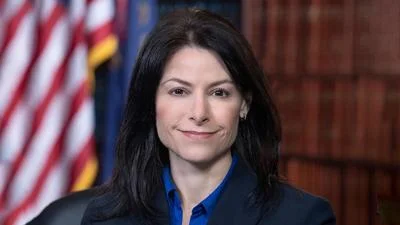Jamie Roe | Provided
Jamie Roe | Provided
Jamie Roe, spokesman for the statewide voter integrity initiative Secure MI Vote, said that the group is “two weeks or so” from submitting its petitions to the Secretary of State’s office for verification.
“We’re pretty confident at this point will have more than enough signatures to get the initiative before lawmakers,” Roe told Great Lakes Wire.
In the meantime, a competing drive, Promote the Vote 2022, submitted 669,972 signatures last Monday, more than the 425,059 required. The initiative would allow full voter access to mail ballots, and allow nonprofits to help underwrite the cost of managing elections – two changes in election law that Secure MI Vote, and other voter integrity advocates, oppose.
“Hopefully, voters will see this for what it really is,” Roe said.
The Secure MI Vote initiative, besides preventing the Secretary of State from mass mailing absentee ballot applications and prohibiting private funding of elections, would require all voters to provide ID. It also provides funding of ID cards for those with no valid ID.
The group missed a June 1 deadline for submitting the needed 340,000 signed petitions when it was reported that that five gubernatorial candidates in the Republican primary were knocked off the ballot for submitting fraudulently signed petitions. The candidates blamed paid circulators for the bad petitions. Secure MI Vote also relied in part on paid circulators.
“We believe we had in the range of 430,000 valid petitions, but the plan is to get more of a cushion,” Roe said for an earlier story.
The missed deadline means that the initiative won’t be placed on the November General Election ballot, but Roe says that isn’t necessary for the provisions in the initiative to become law.
“The Constitution says that all we need is enough valid signatures and approval by state lawmakers to make the changes law,” he said.
The Republican-controlled Legislature had earlier approved the election reform measures only to have them vetoed by Gov. Gretchen Whitmer, a Democrat.
Roe added that his hope is that the Secretary of State’s office doesn’t “drag its feet” in verifying the signatures. In March, Secretary of State Jocelyn Benson rejected a Republican plan for verifying voter signatures
In its signature drive, Secure MI Vote has also been up against an alleged effort by an opposition group that paid circulators not to circulate petitions for election reform. The opposition, Groundgame Political Solutions, violated state law by failing to report the payments, according to an attorney representing one of the circulators.
“Section 43 of the Michigan Campaign Finance Act requires a ballot committee to report expenditures made by those working for it,” Troy Cumings, with the law firm of Warner Norcross & Judd, told Legal Newsline for an earlier story. “Groundgame paid Dustin Wefel (Cumings’ client) and likely others to support its services to Protect MI Vote, including to refrain from obtaining signatures for the Secure MI Vote ballot committee. Yet neither Groundgame nor Protect MI Vote reported those payments. Section 43 of the Michigan Campaign Finance Act specifically prohibits a committee like Protect MI Vote from hiding its expenditures like this through a consultant.”






 Alerts Sign-up
Alerts Sign-up